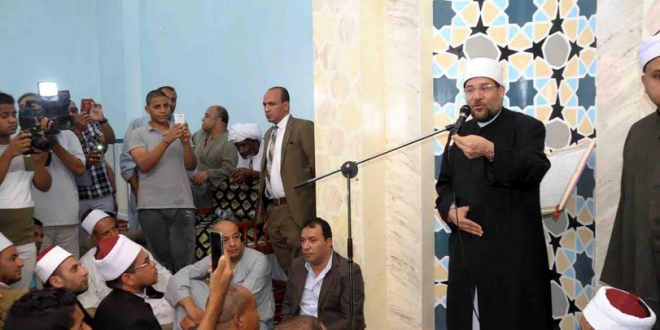Egypt is holding intensive training camps for imams across the country to renew religious discourse, spread moderate teachings of the religion and fight extremist ideologies.
The camps are organized by Al-Azhar, Egypt’s top seat of Islamic education, in cooperation with the Ministry of Religious Endowments in the border areas, southern governorates, the Delta region and coastal cities.
The minister of religious endowments, Mohamed Mokhtar Gomaa, told local media that such training camps are aimed at honing the skills of imams and qualifying them to disseminate what he deemed “true” and moderate teachings of Islam as well as to combat terrorism and extremism.
The camps are part of efforts made recently by Al-Azhar and the Ministry of Religious Endowments to eliminate terrorism and correct flawed conceptions about Islam.

Amna Noseir, a member of parliament and a professor of Islamic Studies at Al-Azhar University.
Amna Noseir, a member of parliament and a professor of Islamic Studies at Al-Azhar University, said holding such training camps is a move in the right direction if implemented correctly, as this would help undermine the ideologies that political Islamic groups want to spread across the country’s governorates.
“If imams are well-trained at those camps on how to convey the correct image of Islam, the training would make a difference and would be a sound move by Al-Azhar and the Ministry of Religious Endowments,” she added.
Noseir advocates the decision to hold these camps in border areas such as in the governorates of Suez, Ismailia, Port Said and Upper Egypt, saying the training can enable imams to correct many religious misconceptions, often due to high illiteracy and poverty rates, instilled in the minds of the people in those areas for decades.
According to a 2015 report by the Central Agency for Public Mobilization and Statistics (CAPMAS), illiteracy rates were at their highest in Upper Egypt: 32.1% of residents in the southern governorate of Minya were illiterate, as were 31.4% in Sohag governorate and 29.6% in Beni Suef. Another CAPMAS report released in 2015 showed that approximately 56.8% of residents in Upper Egypt cannot meet their basic needs.
“Those areas are in dire need of a renewed religious discourse that can eliminate misunderstandings about Islamic teachings,” Noseir said.
The undersecretary of the parliamentary Religious Affairs Committee, Maj. Gen. Shokry al-Gendi, also highlighted the significance of holding training camps for imams in border areas, including Port Said, Ismailia and Suez, to dismantle extremist ideologies and explain the tolerance of Islam. “Shedding light on border areas is a very important move, especially with regard to the Ministry of Religious Endowments’ endeavors to train imams on facing extremist ideas across the country,” Gendi told local media.
Since the 2013 ouster of President Mohammed Morsi and the mass protests against his rule, Egypt has launched a fierce crackdown on terrorists and extremists.
Since then, terrorist attacks have targeted police and army forces in the Sinai Peninsula and in other parts of the country, including in Cairo. To counter these developments, the authorities have been fighting extremist speeches at mosques, tightening the grip on preachers affiliated with the now-banned Muslim Brotherhood group and others promoting extremist discourse, in addition to removing books supporting radicalism from mosques.
In July, Al-Azhar launched fatwa kiosks at Al Shohada metro station in downtown Cairo to counter radical ideology and promote the moderation of Islam.
President Abdel Fattah al-Sisi has urged Al-Azhar several times to re-energize its religious discourse and get closer to youths to protect them from adopting extremism.
In 2015, Al-Azhar launched an observatory aimed at fighting radicalism and extremist fatwas. The observatory operates in 10 languages and follows social media networks to track the rhetoric spread by terrorist groups and rebut their statements through specialized Al-Azhar scholars. The observatory also issues statements that clarify and warn against atypical fatwas to raise awareness among people about what religious edicts are correct.
Egypt’s Dar al-Ifta, a state institution that issues religious edicts to advise Muslims on spiritual and life matters, had earlier launched an observatory to rebut fatwas and the rhetoric of terrorist organizations.








































admin in: How the Muslim Brotherhood betrayed Saudi Arabia?
Great article with insight ...
https://www.viagrapascherfr.com/achat-sildenafil-pfizer-tarif/ in: Cross-region cooperation between anti-terrorism agencies needed
Hello there, just became aware of your blog through Google, and found ...